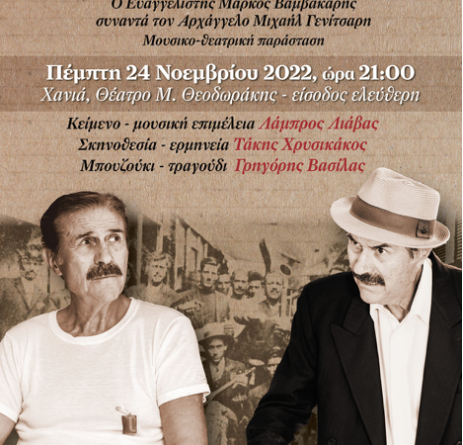Musical theatre: ‘According to Markos’ (Vamvakaris), history of Rebetiko – Chania 24th November
The performance presents the historical and social conditions that gave birth to the Rebetiko tradition and defined its style and ethos.
WHEN: 24th November 21.00
WHERE: Mikis Theodorakis Theatre, Old Customs House, Katechaki 8, Venetian Harbour, Chania
Entrance: free
Starting point of this very special musical theatre is the dramatized narratives of two of the leading rebetes, (Rebetiko musicians) Markos Vamvakaris and Michalis Jenitsaris, from the beginning of the 20th century to the 60s, as well as other representative texts of the period.
Through their memories, stories and songs, we start from Markos’ home, the island of Syros, end up in Piraeus of the interwar era, where the Smyrna School gives way to the Piraeus Rebetiko. In a critical and transitional time, with refugees and port workers pushed to the margins, we follow their initiation into the world of the “piazza” and the passionate and intense life of the Rebetiko musicians, with their particular ideology, values and symbols. The main means of expression and symbol of identity of this world are song, music and dance, through which the viewer is also “initiated” into the style and ethos of classical Rebetiko.
In the theatrical monologue of the two protagonists unfold the special position and role of musicians among the mages, the ritual of the café and the teke ( (a Turkish word, originally meaning a monastery for Dervishes , usually a side room off a coffee house or taverna), the experiential relationship with the bouzouki, the semiology of Zeibekiko (originally a dance for two armed people facing one another, it developed into an improvised dance for a single male), the chase by the police, censorship and displacements from the dictatorship of Metaxas, the differentiation in the performance of Rebetikos after the War with urbanization and the transition to the famous masters – stars of the song.
The entire theatrical approach places particular emphasis on the “ritual” character of the Rebetiko performance, with the structure of the performance and the configuration of the stage space presenting the atmosphere of a “Popular Liturgy”, where “the Evangelist Markos (Vamvakaris) meets the Archangel Michael (Jenitsaris)”!
Source: chania-culture.gr

ABOUT MARKOS VAMVAKARIS:
Markos Vamvakaris was a well known Rebetiko musician, born in 1905, in Ano Chora on the island Syros.
He came from a Catholic family that was very poor, but rich with a passion for music. Markos’ father played the bagpipe, and his grandfather wrote songs.
His family belonged to the island’s large Roman Catholic community, the “Francosyrians,” a term derived from the colloquial Greek reference to West Europeans collectively as “the Franks.”
Markos had many jobs and had worked as a shoe polisher, a paperboy, and a worker in the yarn industry since he was a child. He left Syros at the age of 12 and moved to Piraeus, where he worked in various other jobs for the next several years.
At a later age he decided to learn how to play the bouzouki and began writing his first songs. He watched a bouzouki player play one day and promised to himself that if he didn’t learn to play the instrument within six months, he would cut off his own hand with a cleaver.
Markos studied the bouzouki intensively and became an inventive virtuoso player, without ever learning notes.
At the beginning of his career, he performed in illegal hashish-smoking establishments known as tekés; later he and his band performed in more legal clubs and popular taverns.
The band’s compositions became immensely popular, and Markos recorded the majority of them. Among the rebetes community, he was known as “the Frank” (Fragos)
The composers, musicians, and singers of rebetiko were known as ‘rebetes,’ which means defiant, misled or disobedient, a Greek term similar to “Manghes,” someone who is anti-establishment.
One of the most famous songs Markos ever wrote was Fragosyriani in 1935, a classic love song that regained popularity twenty five years later by singer Grigoris Bithikotsis.
Markos’ composition style was straightforward: limited orchestration with melodic lines. The lyrics in his songs, as most rebetiko style songs, frequently addressed poverty, class problems, marriage, love, addiction and immigration. War, unemployment, and death were all inspirations.
Due to the anti-authoritarian style of Rebetiko, the music was banned during the censorship of the Metaxas government in 1937, Markos then had to change his playing style and adapt the lyrics.
Even so, Markos was so famous during the 30s that 50 000 fans attended his concerts, performed in Thessaloniki.
On 8th February, 1972, Markos died at age 66, leaving behind many compositions and songs that are still adored today.
In his home town of Syros a museum exhibition in honour of him.


